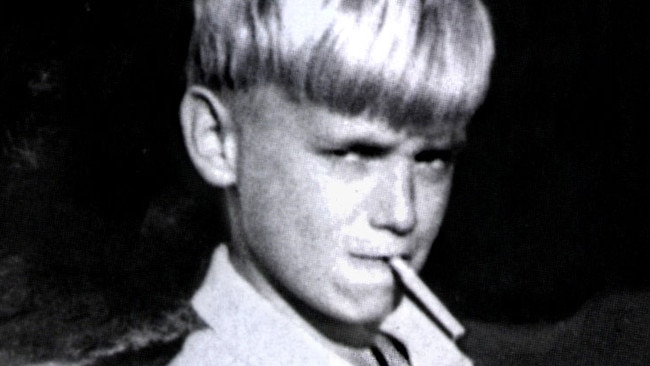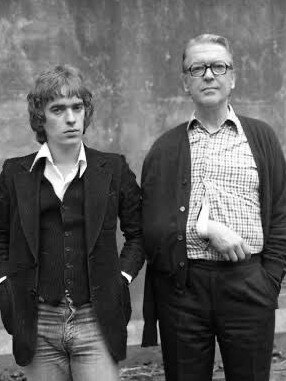Martin Amis: Three yarns that shed light on a brilliant literary career
I always told myself there were two stories about Martin Amis — the cleanest prose writer in the English language — that I would not tell until after his death. This week, I realised there is another.

I always told myself there were two stories about Martin Amis that I would not tell until after his death. When he died this week, aged 73, I realised there were three.
Let’s start with the late addition as it’s perhaps the most contentious. I think Amis, on a sentence-by-sentence basis, was the cleanest – in technique, not topic! – prose writer in the English language over the past 40 years or so.
When I put this thought to Geordie Williamson, this newspaper’s chief literary critic, he agreed but also agreed not everyone would. “He was the supreme stylist of his generation. A punk grammarian: wild yet controlled. So good it was dangerous to try to emulate him.”
Where did it come from? Here are the suspects: his inherent intelligence; his university education (a rare congratulatory first in English from Oxford); the influence of his novelist stepmother Elizabeth Jane Howard, who introduced him to serious literature; and, perhaps most of all, his dad.
You don’t write The King’s English: A Guide to Modern Usage, as Kingsley Amis did in 1997, without knowing a bit about how the language works. In that book, Amis admits his assaults on “linguistic barbarisms” makes him friends and foes. Language and usage do change, after all.
He has an amusing dig at the grammarian HW Fowler, who co-wrote the original King’s English in 1906. One of my favourite entries in this A-Z guide is on how sucking pig – “the ordinary name for a piglet not yet weaned – has morphed into the “more tasteful” suckling pig. I’m not sure if he’s compromising or complaining. “The gain in tastefulness from sucking to suckling may seem small, but every little helps, as the old lady said when she made water into the sea.”
Here’s his son, 23 years later, in his autobiographical final novel Inside Story. The chapter is titled Decorum.

“Cleanse your prose of anything that smells of the flock and the sheep dip … Never say (let alone write) You know what? or I don’t think so or Hello? or Hey …
“Even in a quite handy-looking little tag like anytime soon you can hear the bleats and the cowbells. Don’t write, don’t say, and don’t think Whatever. Shun all vogue phrases, shun all herd words; detect them early and shun them.’’
And this is the son of a father who barely read his work. In a 2000 interview with The Guardian, Amis said he was not too bothered that his father “didn’t always like my stuff”. He added that when he asked the great man to name the novelists he admired, “after (Anthony) Powell and perhaps a little of Henry Fielding, he was reduced to Dick Francis”.
Novelist Julian Barnes, a friend with whom Amis had a falling out, saw an upside. “It’s acted as a form of vaccination for Martin. If his father, whom he loves, dislikes his books, then it really doesn’t matter what any critics say.”
When I ponder Amis pere and fils, I think of ancient Rome and the philosopher, dramatist and orator Seneca the Younger, whose works would influence Shakespeare. His father wasn’t called Seneca the Elder just because he was older.
Seneca the Younger was a stoic and here he and Amis’s characters, and I suspect Amis himself, and his philandering father, part ways.
For the characters, open any page of Amis’s acidly satirical 1984 novel Money, narrated by the booze, drugs and sex hound John Self. For Amis Sr, turn to his 2008 book Everyday Drinking. “The first, indeed the only, requirement of a diet is that it should lose you weight without reducing your alcohol intake by the smallest degree.”
This leads to the next story. I met Martin Amis at the 2014 Perth Writers Festival. We had a long talk, first over drinks and then over dinner. It was a once-in-a-lifetime encounter.
On meeting, we shook hands and I introduced myself. He beckoned me closer and asked, not in a whisper, “Do you have any weed?” I paused, not sure what to say, and he added, “You look like the sort of person who might.”
I told him I didn’t and explained – as though somehow I needed to explain – that I had flown in from Sydney and that drugs and airports don’t mix.
I’ve never been into marijuana but on that evening I preened inside at the thought that The Martin Amis thought I might be The Man.
Amis was a lifelong smoker. The cover of his outstanding 2000 memoir, Experience, written following the 1995 death of his father, also at the age of 73, is of himself, no more than 12, with a cigarette in his gob (a word I think he would have liked).
He died of oesophageal cancer, as did his best friend, Christopher Hitchens, in 2011. Hitch, as he was known, called the shortish Amis “Little Keith”, after a dwarf in his 1975 novel Dead Babies. The two also had a bit of a falling out – over US politics, not nicknames – but it did not dent their friendship.

Amis’s eulogy to Hitchens – you can watch it online – is a thing of love and respect. He concludes by remembering one of his friend’s favourite sayings, “What could be more agreeable.’’
He continues, “To end on a wishful note, what could be more infinitely agreeable, imagine what it would do to your heart, if The Hitch had landed, and was on his way to join us here …”
Literary friendships were important to Amis. He was inspired by Saul Bellow, whom he came to know, and Vladimir Nabokov. He in turn inspired a generation of writers. Anne Enright, the Booker Prize-winning Irish novelist, put it simply in a review of Amis’s 2017 essay collection The Rub of Time. “Damn, that fool can write.”
Another of Amis’s friends was Australia’s Clive James. “He could be the funniest,’’ he told his biographer Richard Bradford (Martin Amis: The Biography, 2011).
Writing, in Inside Story, about the rise of Donald Trump, Amis credits James with creating the Barry Manilow Law, “which states: Everyone you know thinks Barry Manilow is absolutely terrible. But everyone you don’t know thinks he’s great. And bear in mind that the people you know are astronomically outnumbered by the people you don’t know.”
I emailed Amis when James, suffering from leukaemia, was shuffling towards the end of the mortal coil. I asked if, when the time came, he would write a tribute. His response was politely perfect. He basically told me to hold my horses.
Something else Amis may have inherited from his father is the relatively rare ability to make readers laugh, including at themselves. Kingsley’s 1954 debut novel, Lucky Jim, is laugh-out-loud funny. His son’s 1973 debut, The Rachel Papers, which includes a cheeky reference to Lucky Jim, was the funniest book I read in my teens.
When his father died in 1995, Amis called Bellow. “And he told me what I badly needed to hear,’’ he writes in Inside Story. “He was never my ‘literary father’ (I already had one).”
Amis Sr’s 1986 novel The Old Devils won the prize that eluded his son: the Booker. When I spoke on the phone to Amis ahead of his visit to Perth, he said his lack of success on the prize circuit was “because I am my father’s son”.
He continued: “It delegitimises you because you have the taint of heredity. I think that subconsciously or consciously makes people take you less seriously.”
I asked him if he considered using a pseudonym, as he did in his early book reviews. He said he did but “then I thought, no, it is my name”.
It is indeed, and that brings me to the last story. Over dinner that night at the Perth Writers Festival, we chatted generally about the business of writing.
I asked him what happened when he sent in a manuscript. Did the editors/publishers suggest edits, rewrites, offer ideas about the characters, narrative structure, plot or any other part of the book?
His response was immediate, though he did set the scene first. He put down his glass of wine and looked me in the eye.
“F..k no! That would be insulting.”
Here, finally, father and son are on the same page.





